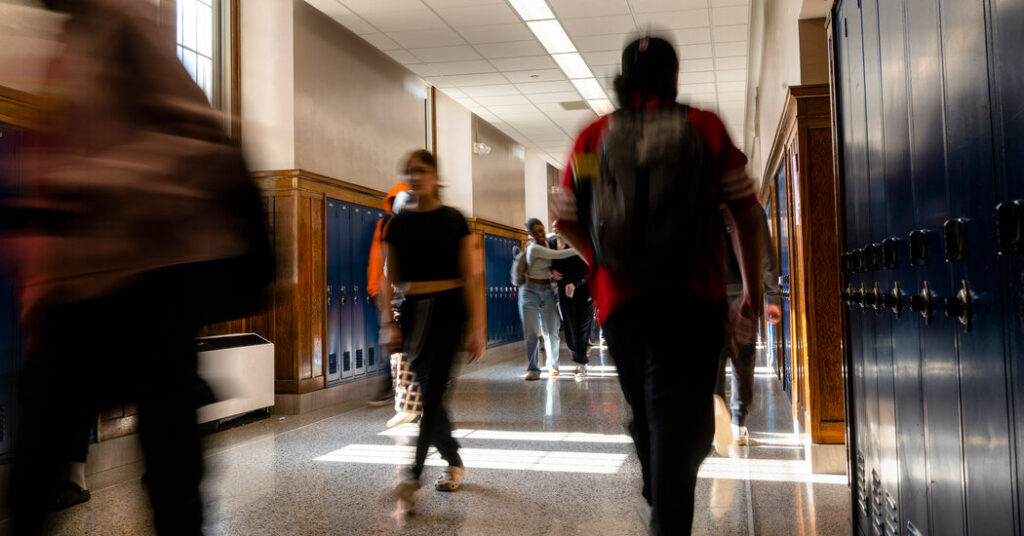
A federal judge in New Hampshire limited on Thursday the Trump administration’s ability to withhold federal funds from public schools that have certain diversity and equity initiatives.
The judge, Landya B. McCafferty, said that the administration had not provided an adequately detailed definition of “diversity, equity and inclusion,” and that its policy threatened to restrict free speech in the classroom while overstepping the executive branch’s legal authority over local schools.
She also wrote that the loss of federal funding “would cripple the operations of many educational institutions.”
The decision followed a demand earlier this month by the Trump administration that all 50 state education agencies attest that their schools do not use D.E.I. practices that violate President Trump’s interpretation of civil rights law. Otherwise, they would risk losing billions in Title I money, which is targeted toward low-income students. About a dozen states, mostly Democratic leaning, refused to sign the document.
In issuing her decision, Judge McCafferty declined to issue a nationwide pause on the policy. Instead, she limited her ruling to schools that employ or contract with at least one member of the groups that brought the lawsuit: the National Education Association, the nation’s largest teachers’ union, and the Center for Black Educator Development, a nonprofit that seeks to recruit and train Black teachers.
The N.E.A. has about three million members, including some in states that bar teachers from collective bargaining. It is possible that most school districts in the nation would be affected by the ruling.
Judge McCafferty was appointed by former President Barack Obama. The Trump administration is expected to appeal her ruling.
The administration had employed a novel legal strategy, arguing that the Supreme Court’s 2023 decision banning affirmative action in college admissions also applied to K-12 education. The government has said that the ruling means public schools should end programs meant to serve specific racial groups.
The Trump administration has not offered a detailed definition of what it calls “illegal D.E.I. practices.” But it has suggested that efforts to provide targeted academic support or counseling to specific groups of students, such as Black boys, amount to illegal segregation. The administration has also argued that lessons on concepts such as white privilege or structural racism, which posits that racism is embedded in social institutions, are discriminatory toward white children.
North Carolina signed the attestation presented by the administration, but in doing so said it disagreed with President Trump’s interpretation of civil rights law, and argued that the attempted ban on D.E.I. had overstepped the department’s authority.
“We will continue working to ensure fairness, remove barriers to opportunity, and make decisions based on merit and need,” wrote Maurice “Mo” Green, the Democratic state superintendent, in a letter to Linda McMahon, the education secretary.
In a hearing last week, Judge McCafferty noted that the administration had sought to ban lessons that caused white students to feel “shame.”
She asked an administration lawyer whether students could still engage with history lessons that traced the concept of structural racism through events like slavery, Jim Crow and the Tulsa race massacre of 1921, in which a thriving Black neighborhood was destroyed by a white mob.
Would teaching such a class be illegal, she asked, if it caused a student to feel ashamed of that history?
A lawyer for the Justice Department, Abhishek Kambli, responded, “It goes toward how they treat the current students, not what they teach.”
These questions may reach the Supreme Court.
Last year, the justices declined to hear a case on diversity efforts in the admissions system of a selective public high school in Virginia. That choice seemed to suggest that the court’s decision on affirmative action in college admissions did not immediately apply to K-12 education.
But Edward Blum, president of Students for Fair Admissions, the conservative legal group that brought the case challenging affirmative action, said he continued to believe the Supreme Court decision had set a precedent for the entire education system, including K-12 public schools.
His group has filed an amicus brief in the suit brought by the N.E.A. and A.C.L.U., backing the Trump administration’s reading of civil rights law.
“As some of the justices have signaled, it is my belief that the court is waiting for a case with the right procedural posture and factual record to address K-12 racial policies and programs,” Mr. Blum said.
Maya Shwayder contributed reporting.





